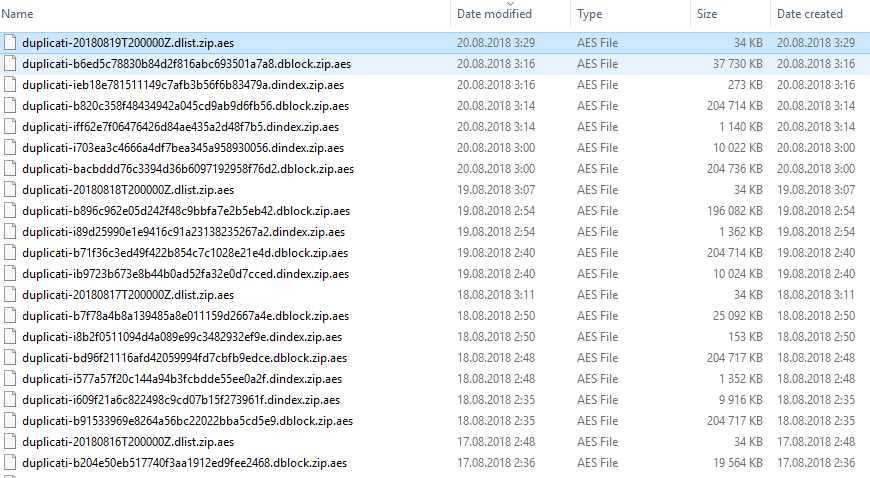Hello, I’m using Duplicati for long time, but this is biggest problem I encountered, so I need help.
- Duplicati version : 2.0.3.2
- Operating system : Windows 2012R2
- Backend : SMB
- Backup size : source 86GB, backup 67GB, 150 versions
Backup job was interrupted by windows update reboot.
Next backup failed with:
Failed: Found 6 file(s) with missing blocklist hashes
System.IO.InvalidDataException: Found 6 file(s) with missing blocklist hashes at Duplicati.Library.Main.Database.LocalDatabase.VerifyConsistency(IDbTransaction transaction, Int64 blocksize, Int64 hashsize, Boolean verifyfilelists) at Duplicati.Library.Main.Operation.BackupHandler.Run(String[] sources, IFilter filter) at Duplicati.Library.Main.Controller.<>c__DisplayClass17_0.<Backup>b__0(BackupResults result) at Duplicati.Library.Main.Controller.RunAction[T](T result, String[]& paths, IFilter& filter, Action`1 method) at Duplicati.Library.Main.Controller.Backup(String[] inputsources, IFilter filter) at Duplicati.Server.Runner.Run(IRunnerData data, Boolean fromQueue)
I already tried to fix this:
- Repair - no problem or
Unexpected update count: 0 at Duplicati.Library.Main.Database.LocalRepairDatabase.FixMissingBlocklistHashes(String blockhashalgorithm, Int64 blocksize) at Duplicati.Library.Main.Operation.RepairHandler.RunRepairCommon() at Duplicati.Library.Main.Operation.RepairHandler.Run(IFilter filter) at Duplicati.Library.Main.Controller.RunAction[T](T result, String[]& paths, IFilter& filter, Action`1 method) at Duplicati.Library.Main.Controller.Repair(IFilter filter) at Duplicati.CommandLine.Commands.Repair(TextWriter outwriter, Action`1 setup, List`1 args, Dictionary`2 options, IFilter filter) at Duplicati.CommandLine.Program.RunCommandLine(TextWriter outwriter, TextWriter errwriter, Action`1 setup, String[] args) Return code: 100
- Verify - no problem
- list-broken-files - nothing
- purge-broken-files - nothing
- Verify “all” with “–full-remote-verification=true” - I get Examined 907 files and found no errors Return code: 0
So I backed up my 4GB DB and did database recreate. Recreating was fast, 4GB DB in 1,5hours. But I got error:
The database was attempted repaired, but the repair did not complete. This database may be incomplete and the repair process is not allowed to alter remote files as that could result in data loss.
at Duplicati.Library.Main.Operation.RepairHandler.RunRepairRemote() at Duplicati.Library.Main.Operation.RepairHandler.Run(IFilter filter) at Duplicati.Library.Main.Controller.RunAction[T](T result, String[]& paths, IFilter& filter, Action`1 method) at Duplicati.Library.Main.Controller.Repair(IFilter filter) at Duplicati.Server.Runner.Run(IRunnerData data, Boolean fromQueue)
I tried to create bug report and because my DB is larger than 4GB I got:
System.NotSupportedException: Attempted to write a stream that is larger than 4GiB without setting the zip64 option at SharpCompress.Writers.Zip.ZipWriter.ZipWritingStream.Write(Byte[] buffer, Int32 offset, Int32 count) at Duplicati.Library.Utility.Utility.CopyStream(Stream source, Stream target, Boolean tryRewindSource, Byte[] buf) at Duplicati.Library.Main.Operation.CreateBugReportHandler.Run() at Duplicati.Library.Main.Controller.RunAction[T](T result, String[]& paths, IFilter& filter, Action`1 method) at Duplicati.Library.Main.Controller.CreateLogDatabase(String targetpath) at Duplicati.Server.Runner.Run(IRunnerData data, Boolean fromQueue)
After recreating DB I’m still stuck
Backup will fail with:
The database was attempted repaired, but the repair did not complete. This database may be incomplete and the backup process cannot continue. You may delete the local database and attempt to repair it again.
And repair will fail with:
The database was attempted repaired, but the repair did not complete. This database may be incomplete and he repair process is not allowed to alter remote files as that could result in data loss
I can still restore backup of DB before repair, but what else can i try?
I have no problem with some data loss in backup, but I don’t want to loose all 150 versions of backup.
Thank you for any ideas.

 which seems like a bit of a long shot, and probably should be tried after trying to bisect repair. The good thing about this idea is that it may be faster because it only needs one download of backend files.
which seems like a bit of a long shot, and probably should be tried after trying to bisect repair. The good thing about this idea is that it may be faster because it only needs one download of backend files.